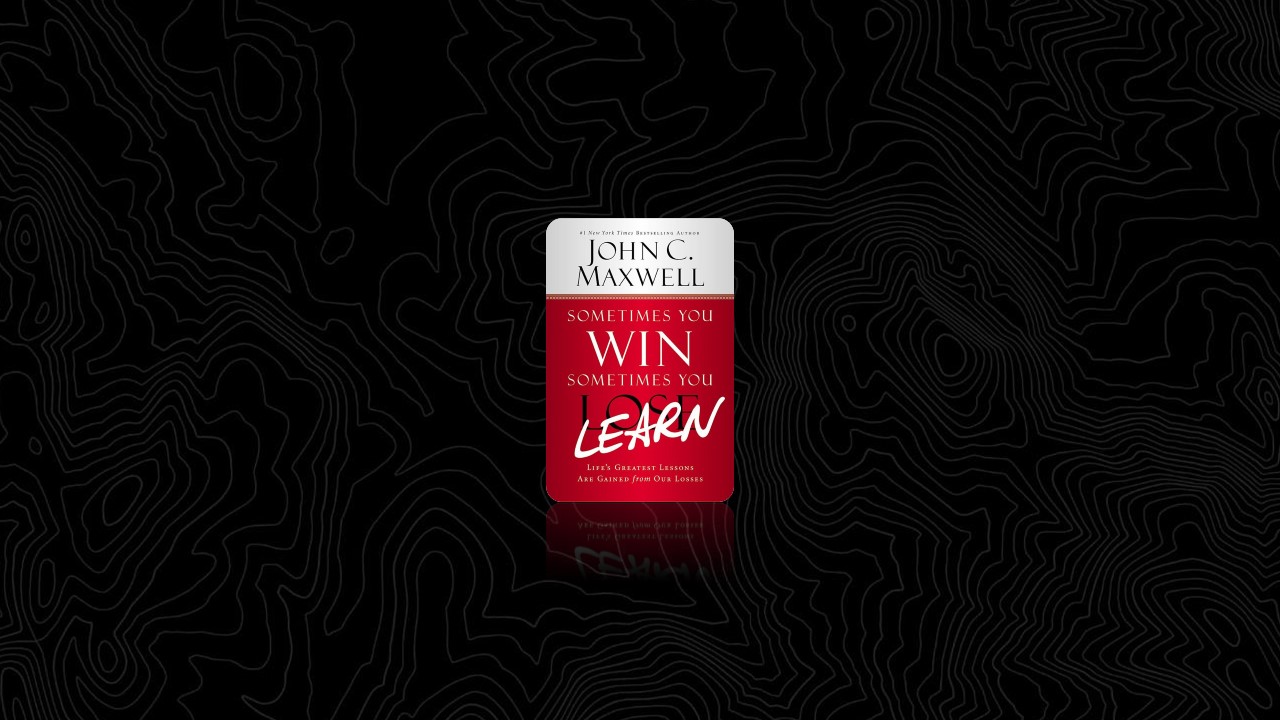When You’re Losing, Everything Hurts
If you’re going to lose—and you are because everyone does—then why not turn it into a gain? How do you do that? By learning from it. A loss isn’t totally a loss if you learn something as a result of it. Your losses can come to define you if you let them. If you stay where a loss leaves you, then eventually you can get stuck there. But know this: your choices will begin to declare you. You can choose to change, grow, and learn from your losses.
That, of course, is not necessarily easy. In a favorite Peanuts comic strip Charlie Brown walks away from Lucy after a baseball game, head down, totally dejected.
“Another ball game lost! Good grief!” Charlie moans. “I get tired of losing. Everything I do, I lose!”
“Look at it this way, Charlie Brown,” Lucy replies. “We learn more from losing than we do from winning.”
“That makes me the smartest person in the world!” replies Charlie.
It’s a good thought, but not everyone learns from his losses. A loss doesn’t turn into a lesson unless we work hard to make it so. Losing gives us an opportunity to learn, but many people do not seize it. And when they don’t, losing really hurts.
I hope this book will add value to you, teaching you how to learn from your losses. Most of us need someone to help us figure out how to do that. If that is your desire—to become a learner from losses—you need to change the way you look at losses, cultivate qualities that help you respond to them, and develop the ability to learn from them.
Humility: The Spirit of Learning
Have you noticed how easily some people bounce back from losses? They learn from them and become even better than they were before! Meanwhile, others seem to fail, fall, and never get back up again. After they experience something negative, you can actually see the downward spiral starting. And no matter how much you want to help them, you can’t. They just don’t learn from their mistakes.
Everyone experiences adversity. Some people are made humble by it. Others are made hard. And they carry that spirit with them everywhere they go. For those who allow themselves to become hard, that’s tragic because it’s very difficult for a hard person to learn anything.
Ezra Taft Benton observed, “Pride is concerned about who’s right. Humility is concerned about what’s right.” That’s a pretty accurate description. Pride causes people to justify themselves, even when they know they’re wrong. And that’s just the start!
Reality: The Foundation of Learning
Your life is probably plenty difficult already. The reality is that you will have to deal with those difficulties already no matter what. One of the keys to winning is to not make things even harder for yourself, which is, unfortunately, what many people seem to do.
Success can have a way of distorting our view of reality. It can make us think we are better than we really are. It can lure us into believing we have little left to learn. It can convince us that we should no longer expect to face and overcome failure. These are dangerous concepts to anyone who wants to keep improving.
How do we fight such ideas? By facing reality. Successful coaches understand the importance of honest and realistic evaluation. In football, that means spending time in the film room grading the performance of the team. My friend Jim Tressel, former coach at Ohio State, says, “Grade the plays the same, win or lose.” Why? Because there is a tendency to not be as objective grading plays when you win as when you lose. Winning causes people to relax and enjoy the spoils of victory. Do that and you just may coast your way to failure.
Responsibility: The First Step of Learning
We tend to think of responsibility as something given to us by someone who is in a position of authority, such as a parent or an employer. And that is often the case. But responsibility is also something we must be willing to take.
Every time we fail, we can choose to put ourselves in the painful but potentially profitable place of taking responsibility so that we can take right actions for our success, or we can avoid the temporary pain of responsibility and make excuses. If we respond right to failure by taking responsibility, we can look at our failure and learn from it. As a result, we won’t be as prone to making the same mistake again. However, if we bail out on our responsibility, we don’t examine our failures and don’t learn from them. As a result, we often experience the same failures and losses repeatedly over time.
Improvement: The Focus of Learning
Improvement doesn’t come to people who fixate on quick fixes. It comes to the slow but steady people who keep working at getting better. If you have a quick fix mindset, then you need to shift it to continuous improvement. That means doing two things:
- Accept the Fact that Improvement Is a Never-Ending Battle
- Accept the Fact That Improvement Is a Result of Small Steps
People today are looking for a secret to success. They want a magic bullet, an easy answer, a single thing that will catapult them to fortune or fame. Success generally doesn’t work that way. As Andrew Wood observed, “Success in most things comes not from some gigantic stroke of fate, but from simple, incremental progress.” That’s pretty boring, isn’t it? It may not be exciting, but it is true. Small differences over time create a big difference! Improvement is achieved in inches, not giant leaps.
Hope: The Motivation of Learning
It’s been said that a person can live forty days without food, four days without water, four minutes without air, but only four seconds without hope. Why? Hope provides the power that energizes us with life. Hope is a powerful thing. It keeps us going when times are tough. It creates excitement in us for the future. It gives us reasons to live. It gives us strength and courage.
I think it’s no coincidence that people who suffer with depression often lack energy. Lack of hope and lack of energy usually go hand in hand. People who have a hard time believing in themselves have a difficult time finding the energy to cope with life and its challenges. In contrast, hope-filled people are energetic. They welcome life and all that it brings—even its challenges.
Winning Isn’t Everything, But Learning Is
The biggest detriment to tomorrow’s success is today’s success. That problem can manifest itself in many ways. Here are the ones observed most often:
Been There, Done That: Some people hit a milestone, and they make it a tombstone. They get bored, lose their curiosity, and disengage. Don’t let that happen to you.
The Banquet Tour: When you succeed, people want to hear your story. However, there’s a real danger that you can replace doing with speaking. Consultant Gail Cooper advises, “When you win an award, set it up in the lobby and go back to work.”
Success Guarantees Success: Just because you can do one thing well doesn’t mean you can do all things well. When you win, maintain your perspective.
The Momentum Myth: People’s natural inclination after a win is to take a break. Bad idea. When you’re winning, capitalize on the momentum. You’ll be able to do things that might otherwise be impossible.
One-Hit Wonders: Have you ever known someone who was successful once—and is still living off of it? It’s a good idea to build off of yesterday; it’s a bad idea to live off of it.
The Entitlement Mind-set: People who have something that they didn’t win for themselves start thinking they are entitled to more. That’s why many inherited businesses go out of business. To keep winning, you need to stay hungry and keep learning.
Playing Not to Lose: After some people win, they become cautious and defensive. They worry about staying on top. Not wanting to do something stupid, they do something stupid; they focus on not losing instead of winning.
The Arrival Plateau: Some people become so focused on a specific goal that when they hit it they give up, because they believe they’ve made it. That mind-set has the power to unmake them.
Any one of these wrong attitudes toward winning can turn a person from winner to loser very quickly. You’ve probably heard the phrase, “The number one rule of winning is don’t beat yourself!” These are some of the most common ways people get off track once they’ve achieved some level of success.
The lessons you have the opportunity to learn will be presented to you in various forms. Fail to learn the lesson and you get stuck, unable to move forward. Learn the lesson and you get to move forward and go to the next one. And if you do it right, the process never ends. There is no part of life that doesn’t contain lessons. If you’re alive, that means you still have opportunities ahead of you to learn. You just have to be willing to tackle them. You have all the tools and resources you need.
The choice is yours. Others will give you advice. Some may even help you, But you have to take the test. Sometimes you will win. Sometimes you will lose. But every time you will have the opportunity to ask yourself, “What did I learn?” If you always have an answer to that question, then you will go far. And you will enjoy the journey.


